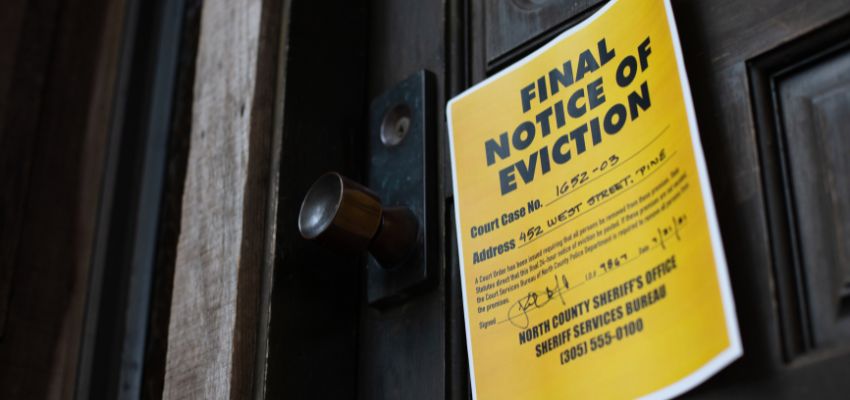What to Do When You Are Being Evicted With No Place to Go

Published July 21, 2023
With the economy as it is right now, a lot of people are surviving on unemployment benefits. But when that runs out, experts predict a record-high eviction rate in the country.
Yes, you read it right. An awful lot of people in the US are, right now, just waiting for their eviction notice. Unfortunately, most of them are being evicted with no place to go.
If you are currently facing eviction, here’s what you can do:
1. Know Your Rights
Access to adequate housing is a fundamental human right. That’s why housing laws in most states have provisions that protect homeowners and renters. The details vary, but in general, it’s illegal for your landlord to kick you out of your home without going through the entire eviction process.
Besides, only the sheriff can enforce the eviction, but only after the eviction notice has passed. So if your landlord waltzes out of nowhere and tells you to pack up, you have the right to say no.
You also have the right to legal counsel if the eviction case has already started. You have the right to appear in court to defend your case too. And if you lose the case, you also have the right to appeal the court’s decision.
Most of the time, tenants don’t realize they have all these rights. So make sure to research your state’s housing laws and know your rights before giving the keys back to your landlord.
2. Stop the Eviction
The eviction process varies by state. But it doesn’t happen overnight. You, yourself, may have been aware of it for some time, especially if you are being evicted for not paying rent.
Besides, it’s a long process from when your landlord files an eviction case to when the sheriff shows up at your doorstep. That should give you ample time to put a stop to it.
There are various ways to prevent an eviction from being carried out. Depending on your state, you can request an order to postpone or stop the move-out notice. Some states, like Massachusetts, give tenants up to 6 months grace period to move out of their homes. While disabled tenants and those aged 60 and above may ask to postpone the eviction for up to 12 months.
If you think that the court’s decision is unfair and that you should not be evicted, you can always file for an appeal. The grace period, however, varies per state. So it’s a good idea to appeal your case right after you learn of the court’s decision.
3. Get Help
As mentioned, you have the right to legal counsel once the eviction case is rolling. Some states will give you this for free. But in most cases, you have to pay for it yourself.
Unfortunately, legal services don’t come cheap. But there are plenty of tenant organizations and legal aid societies you can ask for help. You can look for one in your area and tell them about your circumstances. They’ll be more than willing to help you, especially if you are being evicted through no fault of your own.
You can also ask for help from your church or community. Some churches even do fundraising events to help their members gather enough money for rent.
4. Borrow Some Money
If you’re being evicted because you’re falling behind on rent, borrowing some money will solve your dilemma. If you have a job, you can try applying for payday loans. Some places are also offering loans online. Or you can always ask friends and family for a temporary loan. This especially works if you’re expecting or have just started a job and just need some cash to keep you afloat until the next payday.
5. Sell Some Stuff
Aside from loans, selling your stuff is another way of raising that much-needed rent money. You can sell clothes, jewelry, gadgets, collectibles, some furniture – anything that’s not essential. If that’s not enough, you can also sell your car.

6. Move in With Friends or Family
If all of the above fails and you’re still getting booted out of your house, then the next obvious choice is moving in with friends and family.
You can ask friends if you can couch surf for a few days. Just until you’re able to get back on your feet. If some past issue prevents you from moving in with family members, then consider this as an opportunity to reconnect.
This will affect your ego, of that there’s no doubt. But if it means not sleeping on the pavement, then it’s worth a bruised ego. Besides, if they really care for you, they’ll understand.
7. Look for a Local Shelter
Unfortunately, not all of us have people we can turn to when facing eviction. If you’ve just moved to the city or have just immigrated, your family and friends might be miles away to be of some help. In cases like this, local shelters are your best bet.
Shelters are designed to provide accommodation for people with nowhere to go. In some cities, the shelters can be packed. Most shelters also have curfews.
8. Live in Your Car
This might be the first option you had in mind when thinking about your impending eviction. And it’s really practical – if you live in a humid area. But in the northern part of the country, the winters can be unforgiving. If your car doesn’t have a heating mechanism, you could freeze to death. So if you’re planning to live in your car for the time being, it should be a last resort.
9. Explore Emergency Housing Options
Seeking help from the government might not be at the top of your priority list when facing eviction. But there are some really great emergency housing programs out there. Depending on your circumstances, you may even qualify for expedited housing assistance.
Almost every US state has its own emergency housing services. Because of this, the rules for availing them also tend to vary. Florida, for instance, offers a rehousing package to people and families earning less than half of their area’s average income. While Oregon requires you to have an annual income of less than 80% of your area’s average. Check with your state’s housing division to see their emergency housing offerings.
If emergency housing isn’t an option, the US Department of Housing and Urban Development (HUD) also provides housing vouchers. It’s mostly given to low-income families and people with disabilities to pay for all or part of their rent. You can check with your local public housing agency to see if you’ll qualify for a voucher.
Keep in mind, however, that government programs tend to have a long waitlist. Sometimes, local housing offices also stop accepting applications when they have more families on their list than they can afford to help.
10. Take Advantage of Credit Cards
Credit cards can be a huge help if you’re facing eviction and are a little low on cash. You can use it to temporarily pay for rent – at least until you can get back on your feet. Be careful not to overdo it, though. Credit card transactions often come with high fees. It can also affect your credit score permanently.
Unfortunately, not all landlords accept credit card payments. In such cases, you can still use your card to pay for a hotel room or a rental unit that doesn’t require a security deposit.
Frequently Asked Questions
1. If I pay my rent, can I still be evicted?
Yes, you can still be evicted even if you pay your rent on time. Non-payment of rent is just one of the many reasons why someone gets an eviction notice. You can get booted if you violate your lease agreement or do something the landlord doesn’t agree with. But your landlord must go through the proper eviction process first.
2. What if you don’t leave the property despite being evicted?
As I said, evictions don’t happen overnight. It’s a lengthy legal process that can drag on for months or even years. When you finally get the eviction notice, you’ll usually have a few weeks to gather your things and look for a new home. If you don’t vacate the property within that time, your landlord can bring in law enforcement to force you out of the property.
3. Can you be evicted for not signing a new lease?
Yes, but only when the lease agreement expires. Remember that the lease agreement is the legal bind between you and your landlord. Without it, you have no legal right to stay in your landlord’s property.
Donate To The Poor & Homeless Of South Florida
Our Father’s House Soup Kitchen has fed the poor and homeless in South Florida over 900,000 hot meals since 1993. Our tax deductible non profit organization also accepts and distributes donations such as clothing, toiletries, shoes, bicycles, and more. You can donate to help the poor and homeless through our website.

Reviewed For Factual Accuracy
Our team meticulously fact-checks all website content before publishing. Discover more about our website’s editorial standard here and the dedication we uphold.

About The Author
Judy Ponio is a professional writer and devoted Christian. She has a passion for writing about topics related to morality and helping the poor and homeless. She is the lead author for the Our Father’s House Soup Kitchen blog.
Correct Digital, Inc is paid by private donors to provide website digital marketing services to this non-profit organization.





